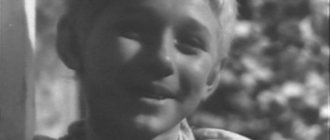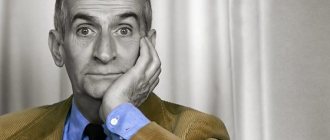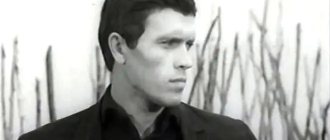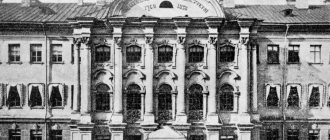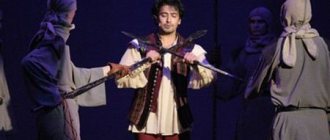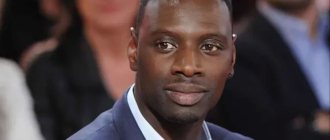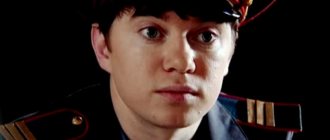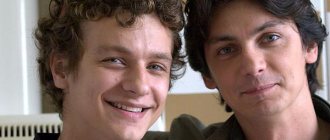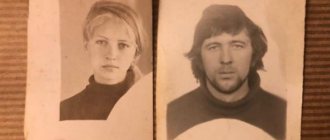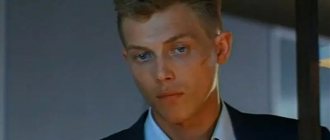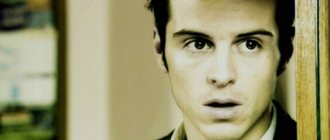Gennady Bortnikov: biography
Today, Soviet actor Gennady Bortnikov is rarely remembered, but meanwhile he was one of the most famous artists of his time. It was impossible to get tickets for productions with his participation, and the performance was praised by Irina Anisimova-Wulf, the “hostess” of the Mossovet Theater Vera Maretskaya and other masters. Subtle, romantic, with an inner fracture, the actor never chose a life partner, despite the fact that he was surrounded by crowds of fans, and died alone, unable to survive parting with art.
Biography
Today, Soviet actor Gennady Bortnikov is rarely remembered, but meanwhile he was one of the most famous artists of his time. It was impossible to get tickets for productions with his participation, and the performance was praised by Irina Anisimova-Wulf, the “hostess” of the Mossovet Theater Vera Maretskaya and other masters. Subtle, romantic, with an inner fracture, the actor never chose a life partner, despite the fact that he was surrounded by crowds of fans, and died alone, unable to survive parting with art.
Childhood and youth
Gennady Leonidovich Bortnikov, Russian by nationality, was born on April 1, 1939 in Moscow into a military family. His father served as a pilot and was known as a strict and authoritarian man. Mother died when Gene was only 7 years old.
Actor Gennady Bortnikov
As a child, the future actor loved to draw and during lessons he made caricatures of teachers, entertaining his classmates and irritating the teachers. He was also seriously interested in theater and willingly took on roles in school plays.
Gena was going to devote his life to art, but his father categorically did not approve of this choice, who dreamed of seeing his son become a military man or an engineer. After finishing the seven-year school, Gennady, at his insistence, entered a mechanical engineering college, but dropped out after studying for only a year and applied to an art school.
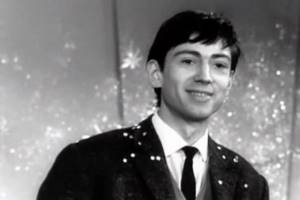
Gennady Bortnikov in his youth
A scandal broke out in the family, and the young man ran away from home, not to friends, but to a monastery, more precisely, to the Trinity-Sergius Lavra. There Bortnikov managed to study religious traditions and try his hand at icon painting (later he even made money from this craft). Returning home, Gennady defended his right to choose his life path and entered the Moscow Art Theater School.
In theater and cinema
There is a page in Bortnik’s biography that he recalls with nostalgia. He spent several months in the famous Trinity-Sergius Lavra. He was quietly engaged in creative work - he painted icons. This skill came in handy when he worked in the theater. But the time came, and Gennady entered the Moscow Art Theater School. As a student, the young man observed how famous and little-known actors lived. The beekeeper's texture was noticed immediately. They noticed that they began to invite me to participate in performances.
The young actor’s career developed quite successfully. He was lucky enough to work with Faina Ranevskaya and Lyubov Orlova. Such experience is worth a lot. Bortnik brilliantly played the role of Raskolnikov in the play “Petersburg Dreams”. This was his finest hour. Gennady was soon invited to go on tour to France. And they not only invited, but also offered a very decent engagement. But the Russian to the core, Gena, gratefully refused. He still had cats in St. Petersburg, which he could not leave.
Creation
Teachers noticed his outstanding talent already in his first year. In his graduation performance, Bortnikov brilliantly embodied the image of Tuzenbach from Chekhov's Three Sisters. At the school he met the famous director Yuri Zavadsky. After graduation, Gennady is invited to Sovremennik, but he makes a choice in favor of the Mossovet Theater. There, the young actor worked on the same stage with the stars of the Soviet theater: Lyubov Orlova, Faina Ranevskaya, Serafima Birman. The newcomer was received warmly in the troupe and willingly helped with everything.
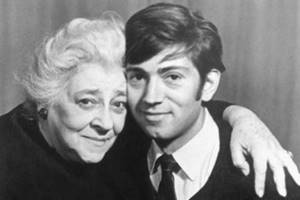
Gennady Bortnikov and Faina Ranevskaya
The first roles in his creative biography in the plays “On the Road” and “The Entertainer” received praise from the most severe critics. The production “Through the Eyes of a Clown” became a landmark for the actor. Bortnikov, having read Heinrich Böll’s novel of the same name in Foreign Literature, personally asked the authorities for permission to stage it. He had to find the author himself, who was then living in Germany, and a letter sent almost at random with a request to transfer copyrights still reached the addressee. As a result, the performance turned out to be so successful that it remained in the theater’s repertoire for 20 years.
Irina Anisimova-Wulf trusted Bortnikov with the main roles in her productions. His most famous work is Raskolnikov
in "Petersburg Dreams". At the height of his career, Gennady Leonidovich was noticed by a French director and, together with the troupe, went on his first foreign tour.
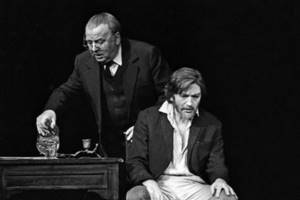
Boris Ivanov and Gennady Bortnikov in the play “Petersburg Dreams”
The Parisian theaters appreciated Bortnikov's talent and offered to stay, promising unimaginable fees and the creation of his own troupe, but he laughed it off, saying that he had no one to leave the cats with. Some colleagues considered the refusal a sign of “star fever,” but in fact he simply loved his native theater and was afraid of later finding himself in a foreign land unclaimed, without friends and funds, and he did not understand French at all.
In Paris, Bortnikov became friends with Serge Lifar, although Zavadsky warned him against a dubious acquaintance: the famous choreographer’s unconventional sexual orientation cast a shadow on the young actor’s reputation.
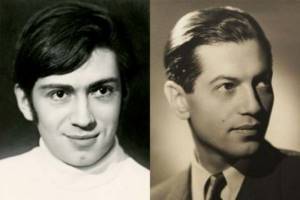
Gennady Bortnikov and Serge Lifar
Gennady Leonidovich not only played in plays, but also appeared on television and radio, and starred in films (“Hell Exploded”, “Grown Children”). In total, Bortnikov's filmography includes 25 films, and he was very worried that he had not made more.
The actor also did not abandon his favorite hobby from childhood - drawing - and personally participated in the design of performances. Today, an exhibition of his works can be seen in the House of Actors on Arbat.
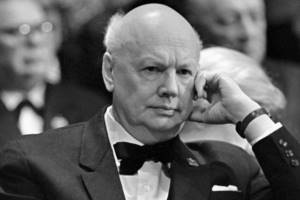
Yuri Zavadsky
In 1997, the main mentor, Yuri Zavadsky, passed away.
“Gena took his death very hard,” recalls Bortnikov’s close friend Evgeny Kovalev in an interview. “It was scary to look into his empty and lifeless eyes. After all, all theatrical ideas also sank into the abyss.”
From that moment on, Gennady Leonidovich’s career began to decline. Leading roles were no longer given, and supporting roles could not maintain their fading popularity. Bortnikov was always particularly successful in the roles of young, desperate guys, but as he grew older, naturally, they stopped inviting him to them. He could not find a new role and gradually began to abandon “age” characters.
Gennady Bortnikov (1939-2007) - Soviet theater and film actor of the 1960s-1980s - was a real idol of his generation. The roles of 30-year-old Bortnikov in the Mossovet Theater productions “On the Road” (1963), “Uncle’s Dream” (1965), “Through the Eyes of a Clown” (1968), and “Petersburg Dreams” (1969) brought him incredible success, sometimes on the verge of mass success. hysteria. Two works - Hans Schnier in "...The Clown" based on the novel by Heinrich Böll and Raskolnikov in "...Dreams" based on Dostoevsky - became decisive in the life of a bright young artist, surrounded by the care of his main director Yuri Zavadsky (1894-1977) and the love of fans.
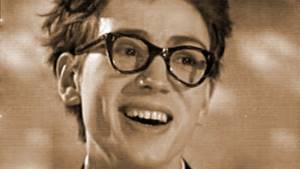
Gennady Bortnikov. 1962. Still from the film “Cheryomushki”
Hundreds of girls, young and not so young (“it was impossible to pass, they stood like in Pyatnitsky’s choir, tightly packed…”), waited for the artist at the service exit or filled the small theater “Aquarium”. Hoping for an answer, they left notes with touching declarations of love wherever possible. They say that 30 years later, during the next renovation, yellowed messages were still being discovered in the theater - in the heating radiators, behind the cladding panels. It is not difficult to notice that among the crowd of girls waiting for the idol, there were unexpectedly many young men. For two decades, Gennady Bortnikov remained the unofficial leader of the unofficial Moscow homosexual community.
His novels are covered in gloomy legends about unimaginable experiences and even tragedies. Let's say a certain student poisoned himself with pills and left a touching letter with confessions addressed to Bortnikov. These stories, overgrown with details and turned into legends, reached the beginning of the 2000s, when the actor, almost forgotten, quietly ended his life.
Gennady Bortnikov was born into a family that had nothing to do with art. My father and brother are pilots, my mother is a housewife. Much earlier than the theater, Gennady became interested in drawing, and for a long time did not part with a pencil and notepad. This connected him with the theater. “I thought that I would be the second Raphael or Michelangelo; the Wanderers did not attract me,” Bortnikov recalled ten years before his death. “And then one day one of my street friends said that there was a drama club nearby. I came there out of interest, thinking that I would be an artist there too...” After school, he designed several performances in a circle. Then he was offered a role - one, two. But Bortnikov did not aim professionally at art - after 7th grade he was sent to a mechanical engineering college “for educational purposes” and worked as a mechanic at a factory. He dropped out of college and entered the Surikov Art School. He didn’t finish it either, but he started studying at a youth theater studio. And only then did he set his sights on drama school, passed exams for a high school course as an external student, and was accepted into a studio school at the Moscow Art Theater. After graduation, he moved to the Mossovet Theater, where he worked from 1963 until his death.
“I thought that I would be the second Raphael or Michelangelo; the Wanderers did not attract me. And then one day one of my street friends said that there was a drama club nearby. I came there out of interest, thinking that I would be an artist there too...”
There he was met by Yuri Aleksandrovich Zavadsky, a living classic of Soviet directing, People's Artist of the USSR, many times laureate, who was known in the theater world as a wizard of “overcoming intimacy.” Zavadsky had several same-sex romances in his life. Simon Karlinsky, citing the memoirs of Marina Tsvetaeva, claims that in 1918 Zavadsky and the future famous Soviet poet Pavel Antokolsky (1896-1978) “had a love affair” “... and made no secret of their relationship.” However, by the end of the 1920s they both started families. That did not stop the same Zavadsky from boldly discussing the topic of “homosexuality” in an interview that journalist and psychologist Vladimir Shakhidzhanyan interviewed him for Literaturnaya Gazeta in the late 1960s and early 1970s. Zavadsky’s “calm reflections” about “same-sex (“homosexual” he corrected this very word when he endorsed the interview) love”, of course, did not make it into the issue. But this confirms the opinion that the authority and connections of Yuri Zavadsky, who, of course, was dedicated especially to the sexuality of perhaps the brightest young actor of his theater, helped Bortnikov avoid the catastrophic consequences of rumors circulating around the capital about his lifestyle and “same-sex "novels. Bortnikov’s remark in one of his most frank interviews also comes to mind here. It is about how Zavadsky warned a young actor who went to Paris in 1965 to meet with choreographer Serge Lifar (in the 1920s, a protégé and lover of Sergei Diaghilev). “Be careful with Lifar. He has a bad reputation,” Zavadsky worried.
The acting career of Gennady Bortnikov, who played his best roles on the stage of the Mossovet Theater, began in cinema. In the USSR, cinema and theater sometimes existed in competition and even harsh opposition to each other. Therefore, Bortnikov worked on his first role in the film “Grown Children” in secret from his Moscow Art Theater teachers. The family comedy, in which the actor had a supporting role, was released in 1962 and was among the box office leaders - 29 million viewers. There was a scandal at the school - the name of the 22-year-old actor appeared in the credits immediately after “old people,” and his face was featured on the posters. Bortnikov’s membership in Komsomol activists saved him from expulsion.
“Be careful with Lifar. He has a bad reputation...”
In 1963, at the Mossovet Theater near Zavadsky, Bortnikov immediately received the main role in one of the plays by playwright Viktor Rozov, “On the Road.” He portrayed a typical “Rozovsky boy” - under this definition, numerous teenagers of the “Thaw” entered the history of Soviet theater and cinema, uncompromising idealists, for whose roles directors selected very handsome young men. The performance “made friends” between Bortnikov and Faina Ranevskaya: she called him her theatrical grandson and praised him everywhere. The actor often visited her house. And, what’s interesting: her “dislike” and constant “conflicts” with Zavadsky - “a whore in a cap” and “a teapot on which a condom was pulled” - did not in the least interfere with her touching friendship with the director’s favorite actor. In an almost family photograph, there is a “theater grandmother” hugging her “theater grandson.” The great actress presses her cheek to his and holds his hand, as if afraid to let go. And it’s difficult to understand who is the child here and who is the elder...
In “Through the Eyes of a Clown” (1968) and “Petersburg Dreams” (1969) the main star roles were played by Gennady Bortnikov. Raskolnikov is the actor’s most high-profile work, thundering throughout the Union. And the abandoned clown Hans Schnier is the longest: the performance ran for almost 20 years, and developed along with the era.
After the death of director Yuri Zavadsky, the number of new roles for Bortnikov began to rapidly decline. In 1980, he again shone in the stage interpretation of Dostoevsky and captivated the audience with the virtuoso role of Smerdyakov in The Brothers Karamazov. There were two or three more main roles, and then there was silence. For ten years since 1990, I did not receive any roles at all. In 1999, he was denied the opportunity to celebrate his anniversary on the stage of the theater, whose glory he had been responsible for for several decades. The monthly salary of the People's Artist of Russia (he received the title incredibly late - in 1992) was 700 rubles. For the first time in his life, the 60-year-old actor applied for “financial assistance” and was given... 290 rubles. Lack of work, life on the brink of poverty. From the hole into which the theater pushed him in the 1990s, the actor climbed out on his own. I had to sell some paintings. For example, a series of lifetime portraits of Faina Ranevskaya went to English collectors.
In order to somehow compensate for the “creative downtime,” Bortnikov began to pay more attention to painting and writing. His essays were published about the actors of the Mossovet Theater - People's Artists of the USSR Rostislav Plyatt (1908-1989), Leonid Markov (1927-1991). He made several stage adaptations and planned to design a number of performances.
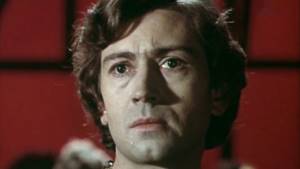
Gennady Bortnikov as Don Carlos. 1980
After Bortnikov did not appear on the Moscow Soviet stage at all for five years, he appeared in several enterprises at once. Finally, he resumed the famous “... Clown”, which was applauded by Moscow and Paris. True, now the actor was playing in front of chewing people in the Nostalgie cafe: “It’s an unusual job to play when people are sitting at tables...” he politely told reporters, “but I took a risk. And they brought in a jazz orchestra...” But, perhaps, this “catering” continuation of the great performance also had meaning, there was the life of a clown.
The actor’s death nine days before his date of birth was called “mystical”, “sudden”, “unexpected” by the press and colleagues. At the beginning of 2007, there were a lot of high-profile acting departures. During their lifetime, the stars seemed to be trying to obscure each other’s last glory.
“...I know the sorrows, the joys, and the small victories of normal people... I can be sad and cheerful, I can be an intellectual at a reception at the embassy and a hooligan in the crowd...”
When seeing off Gennady Bortnikov, many talked about his loneliness and asked for forgiveness. In the interview, they recalled tearful details, such as the fact that loyal girl fans, who had long been grandmothers with grandchildren, were now feeding the lonely old man with homemade pies after the performance.
The actor did not have a family, although his home circle was, by his own admission, quite wide - including his brother’s relatives, who bore the brunt of organizing the funeral.
He loved everyday life, arranged it, and waited for guests in the house. And in my personal life I was not an orphan until the very last day.
WHAT TO READ ABOUT GENNADY BORTNIKOV
- Marina Raikina. An aristocrat with the eyes of a clown // Moskovsky Komsomolets, March 27, 2007
- Gennady Bortnikov. “I can be an intellectual and a hooligan” // Culture, No. 10 (7121) March 19-25, 1998
- Karlinsky Semyon. Homosexuality in Russian literature and culture // Risk. No. 1-2, 1992
But those who were nearby increasingly noticed that he “...was permeated with inescapable melancholy.” “He suffered from loneliness and, by the way, from lack of money too... He was always quite withdrawn and would sit for hours somewhere on a distant bench, where cats from all over the area would flock to him, whom he would welcome, feed and feel very sorry for.” It’s unlikely that anyone could recognize Gennady Bortnikov as a hunched, unshaven old man in dark glasses walking along the streets in the New Arbat area. But it seems that an attentive passerby could discern in him the deep horror of the unforgiven Raskolnikov, and the grimaces of Hans Schnier, and the ardor of the Spanish infanta from Schiller’s tragedy “Don Carlos”... In all of this it was Bortnikov - not an actor, but a person: “...I know and sorrows, and joys, and small victories of normal people... I can be sad and cheerful, I can be an intellectual at a reception at the embassy and a hooligan in the crowd...”
Personal life
A stately handsome man with a velvety voice, Bortnikov in his youth enjoyed incredible success among fans. They bombarded him with letters with declarations of love, kept watch near the theater, cut out photos from newspapers and hunted for autographs, but Gennady led a secluded life and did not seek to have affairs.
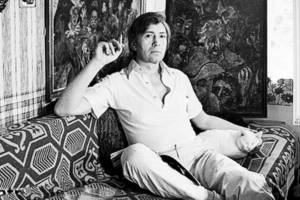
Gennady Bortnikov and his cat
According to friends, he created a shell around himself, into which he did not want to let anyone inside. The artist was afraid of betrayal, worried that those around him valued him only for his popularity and would not stay by his side when the shine of fame faded. He did not like to talk about his novels and carefully protected his personal life from intrusive attention.
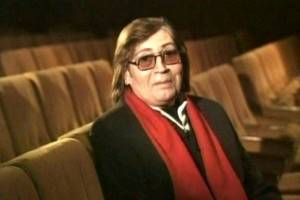
Gennady Bortnikov in recent years
Among the beauties around him, he never chose a wife. He also had no children. The only ones who were always close to him were his pets. Bortnikov had a weakness for animals, kept a mongrel cat, Marik, at home and fed stray dogs, for which he carried pockets full of treats.
Death
They said about Bortnikov that he died of loneliness. His heart could not stand the separation from art - in recent years the actor had not acted anywhere and took it hard. There was no one to support Gennady Leonidovich. He passed away in 2007 at the age of 67. The cause of death was a massive heart attack.
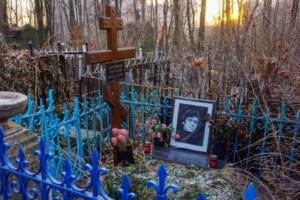
Grave of Gennady Bortnikov
Bortnikov's funeral took place on International Theater Day. His grave is in Moscow at the Vvedensky cemetery. The Mossovet Theater proposed erecting a monument there, but so far a wooden cross still stands at the burial site.
